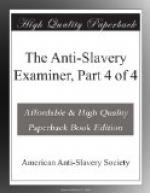“Is water running in our veins?
Do we remember still
Old Plymouth Rock, and Lexington, and
famous Bunker Hill?
The debt we owe our fathers’ graves?
and to the yet unborn,
Whose heritage ourselves must make a thing
of pride or scorn?”
“Gray Plymouth Rock hath yet a tongue,
and Concord is not dumb;
And voices from our fathers’ graves
and from the future come:
They call on us to stand our ground—they
charge us still to be
Not only free from chains ourselves, but
foremost to make free!”
It is of little consequence who is on the throne, if there be behind it a power mightier than the throne. It matters not what is the theory of the government, if the practice of the government be unjust and tyrannical. We rise in rebellion against a despotism incomparably more dreadful than that which induced the colonists to take up arms against the mother country; not on account of a three-penny tax on tea, but because fetters of living iron are fastened on the limbs of millions of our countrymen, and our most sacred rights are trampled in the dust. As citizens of the State, we appeal to the State in vain for protection and redress. As citizens of the United States, we are treated as outlaws in one half of the country, and the national government consents to our destruction. We are denied the right of locomotion, freedom of speech, the right of petition, the liberty of the press, the right peaceably to assemble together to protest against oppression and plead for liberty—at least in thirteen States of the Union. If we venture, as avowed and unflinching abolitionists, to travel South of Mason and Dixon’s line, we do so at the peril of our lives. If we would escape torture and death, on visiting any of the slave States, we must stifle our conscientious convictions, bear no testimony against cruelty and tyranny, suppress the struggling emotions of humanity, divest ourselves of all letters and papers of an anti-slavery character, and do homage to the slaveholding power—or run the risk of a cruel martyrdom! These are appalling and undeniable facts.




